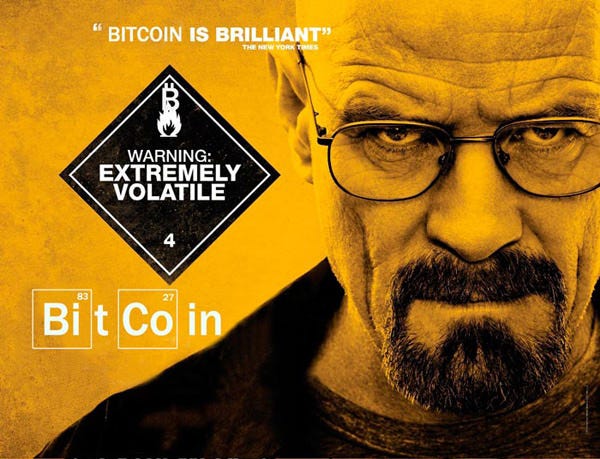Buying Bitcoin Peer to Peer
Quick summary of the pro's and con's of using peer to peer exchanges with some examples
We have talked a lot here about the the importance of self-custody of your Bitcoin. While self- custody is great, you still need to buy your Bitcoin from somewhere unless you earn it or mine it. The collapse of crypto exchanges and hedge funds recently, culminating in the collapse of FTX, have resulted in a renewed focus on why centralized exchanges are problematic. Here are some of the drawbacks of buying bitcoin on a centralized exchange:
Lack of privacy: Centralized exchanges often require users to provide personal information such as ID and proof of address, which can be a concern for those who value privacy.
Risk of exchange hacks: Centralized exchanges hold large amounts of user funds, which can make them a target for hackers. In the event of a hack, users may lose their funds.
Risk of exchange insolvency: Centralized exchanges are typically owned and operated by a single entity, which means that if the exchange becomes insolvent, users may lose their funds.
Limited accessibility: Centralized exchanges are often restricted in certain countries due to regulatory constraints, which can make it difficult for people in those countries to buy and sell bitcoin.
Dependence on a centralized intermediary: Centralized exchanges act as a trusted third party, which means that users are dependent on the exchange to facilitate trades and keep their funds safe.
Risk of government intervention: Centralized exchanges are often subject to government regulations, which means that they can be shut down or forced to comply with certain regulations, which could affect users' ability to buy and sell bitcoin.
Limited payment methods: Some centralized exchanges only accept specific payment methods and can be limiting for users who don't have access to those methods.
Higher fees: Centralized exchanges often charge higher fees for trades and withdrawals compared to P2P exchange.
There are several advantages of buying bitcoin on a peer-to-peer (P2P) exchange, rather than on a centralized exchange:
Increased privacy: P2P exchanges allow users to trade directly with one another, without the need to provide personal information to a centralized entity.
Decentralized control: P2P exchanges are not controlled by any single entity, which means that there is no central point of failure and the exchange cannot be shut down by governments or other organizations.
Greater accessibility: P2P exchanges are often accessible in countries where centralized exchanges are not, making it possible for people in those countries to buy and sell bitcoin.
Avoidance of exchange hacks: P2P exchanges typically hold less user funds, which reduces the potential for large-scale exchange hacks and resulting in loss of funds.
Flexibility in payment methods: P2P exchanges often support a wider range of payment methods, such as cash or bank transfers, making it easier for users to buy and sell bitcoin.
While peer-to-peer (P2P) exchanges have several advantages, there are also some drawbacks to consider:
Lack of regulation: P2P exchanges are not subject to the same regulations as centralized exchanges, which can make them a less secure option for buying and selling bitcoin.
Counterparty risk: When trading on a P2P exchange, you are dealing directly with other individuals, which means that there is a risk that the other party may not fulfill their end of the trade.
Limited liquidity: P2P exchanges may not have the same level of liquidity as centralized exchanges, which can make it more difficult to buy and sell bitcoin at a fair price.
Lack of customer support: P2P exchanges often do not have the same level of customer support as centralized exchanges, which can make it more difficult to resolve disputes or get help if something goes wrong.
Possibility of scams: As P2P exchanges are not regulated, there is a higher possibility of fraud and scams. It is important to do your due diligence and check the authenticity of the counterparty before conducting any trade.
Slower transactions: P2P exchanges transactions are often slower than centralized exchanges due to the need for manual verification and processing of the transaction by both parties (i.e., escrow process).
The price of bitcoin can vary depending on the exchange you use to buy it. In general, prices on peer-to-peer (P2P) exchanges are often similar to or slightly higher than prices on centralized exchanges because P2P exchanges have less liquidity and a smaller order book.
However, it's not always the case, the prices may also depend on the location and the payment method used. For example, if you are buying bitcoin with cash on a P2P exchange, you may end up paying a higher price than if you were to buy it on a centralized exchange with a bank transfer.
Additionally, P2P exchanges often charge lower trading fees compared to centralized exchanges, which can offset any potential difference in price.
It's worth noting that it's always recommended to check prices and fees across multiple exchanges before buying bitcoin, as prices can fluctuate and different exchanges may offer different deals or promotions at any given time.
Here are a few examples of peer-to-peer (P2P) bitcoin exchanges that are currently operating:
Paxful: Paxful is a P2P marketplace that allows users to buy and sell bitcoin using over 300 payment methods, including bank transfers, gift cards, and cash deposits. It offers escrow services to protect both buyers and sellers.
LocalBitcoins: LocalBitcoins is a P2P platform that allows users to buy and sell bitcoin in over 240 countries, including cash transactions. It offers an escrow service to protect buyers and sellers.
Bisq: Bisq is a decentralized P2P bitcoin exchange that allows users to trade bitcoin without the need for a centralized intermediary. It supports various payment methods such as bank transfers, cash deposits, and cash by mail.
Hodl Hodl: Hodl Hodl is a P2P bitcoin exchange that allows users to trade bitcoin directly with each other without the need for a centralized intermediary. It offers multisig escrow as a security measure.
BitQuick: BitQuick is a P2P bitcoin exchange that allows users to buy and sell bitcoin using cash deposits at banks and other financial institutions. It offers escrow services to protect both buyers and sellers.
These are just a few examples of P2P exchanges that are currently operating, and there may be others available in your region. It is important to do your own research and choose an exchange that fits your needs and preferences.
Not financial or legal advice, for entertainment only, do your own homework. I hope you find this post useful as you chart your personal financial course and Build a Bitcoin Fortress in 2023. To see all my books on investing and leadership, click here.
Always remember: freedom, health and positivity!
Please also check out my Building a Financial Fortress Podcast on YouTube here and on all your favorite streaming platforms. I do a weekly Bitcoin news update every week on current items of interest to the Bitcoin community, usually 30 to 60 minutes depending on the number of topics to cover. Please check it out if you haven’t already.





